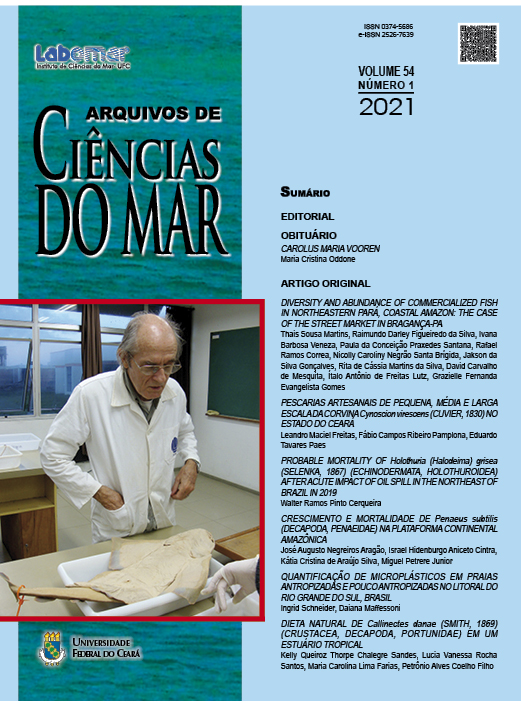Growth and mortality of Penaeus subtilis (Decapoda, Penaeidae) on the amazonian continental shelf
DOI:
https://doi.org/10.32360/acmar.v54i1.41667Abstract
The present paper determines the growth parameters and mortality of Penaeus subtilis in the Amazonian continental shelf. Data from biometric samples obtained on board industrial trawlers from 2000 to 2004 were utilized. The growth parameters and natural mortality were estimated using the computer sofware FiSAT II. It has been found that females grow more than males and are always present in greater proportion in catches (61%). Asymptotic lengths were estimated at 231 mm (k = 1,6 year-1) and 205 mm (k = 0,94 year-1) and the values of total mortality were 5,2 year-1 and 5,5 year-1, for females and 1,83 year-1 males respectively. Estimates of natural mortality were: 2,53 year-1 for females e 1,83 year-1 for males. The values of longevity for females (1.88 years) seem reasonable, but for males (3.19 years) they are very high due to the low value of k and the fact that the formula used (3/k) is only an empirical approximation. The estimated values for the growth performance index Ø’ for females (1,54) are compatible with the auximetric grid proposed for peneids, but for males (1,2) they are also very low. For females, the estimated fishing mortality (F) was 2,67 year-1, for a survival rate of 60%, and for males 3,67 year-1, for a survival rate of 40%.
Keywords: brow shrimp, industrial fishing, population dynamics, North region
Downloads
Downloads
Published
Issue
Section
License
1. Proposta de Política para Periódicos de Acesso Livre
Autores que publicam nesta revista concordam com os seguintes termos:
- Autores mantém os direitos autorais e concedem à revista o direito de primeira publicação, com o trabalho simultaneamente licenciado sob a Licença Creative Commons Attribution que permite o compartilhamento do trabalho com reconhecimento da autoria e publicação inicial nesta revista.
- Autores têm autorização para assumir contratos adicionais separadamente, para distribuição não-exclusiva da versão do trabalho publicada nesta revista (ex.: publicar em repositório institucional ou como capítulo de livro), com reconhecimento de autoria e publicação inicial nesta revista.
- Autores têm permissão e são estimulados a publicar e distribuir seu trabalho online (ex.: em repositórios institucionais ou na sua página pessoal) a qualquer ponto antes ou durante o processo editorial, já que isso pode gerar alterações produtivas, bem como aumentar o impacto e a citação do trabalho publicado (Veja O Efeito do Acesso Livre).

